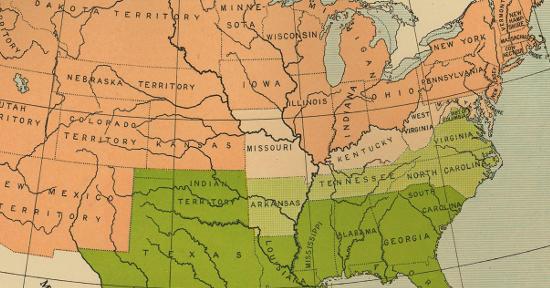- Joined
- Mar 6, 2019
- Messages
- 32,060
- Reaction score
- 32,025
- Location
- PNW
- Gender
- Male
- Political Leaning
- Other
The "seeds" of the Civil War were sown in 1793, by one man, who indirectly created the conditions in both the North and South: Eli Whitney. When the Constitution was ratified, slavery had a sunset clause. 1808. Not that it would be abolished, but because it was a dying institution, and the agreement was that importing slaves would be outlawed, and was immediately. Not that the practice stopped, smuggling was rampant, but it metastasized. Interstate transport and sale was not prohibited, only importation.
"At the Constitutional Convention in 1787, delegates fiercely debated the issue of slavery. They ultimately agreed that the United States would potentially cease importation of slaves in 1808. An act of Congress passed in 1800 made it illegal for Americans to engage in the slave trade between nations, and gave U.S. authorities the right to seize slave ships which were caught transporting slaves and confiscate their cargo. Then the "Act Prohibiting the Importation of Slaves" took effect in 1808. However, a domestic or "coastwise" trade in slaves persisted between ports within the United States, as demonstrated by slave manifests and court records."

 www.archives.gov
www.archives.gov
"Inventor, mechanical engineer and manufacturing pioneer, Eli Whitney is best known as the inventor of the cotton gin, patented in 1794. An unforeseen byproduct of Whitney's invention, a labor-saving device, was to help preserve the institution of slavery in the South by making cotton production highly profitable. Exports of cotton from the U.S. skyrocketed exponentially after the introduction of the cotton gin. Between 1820 and 1860, cotton represented over half the value of U.S. exports.
Prior to the invention of the cotton gin, slavery was in decline. The profitably of crops grown with slave labor, such as rice, tobacco, indigo and cotton was steadily decreasing. Some slaveholders began freeing their slaves in response. By effortlessly separating the seeds from the cotton fibers, the cotton gin removed the main obstacle to producing cleaned cotton. As the price of cotton decreased, the demand for cotton soared; so too did the demand for more land and more slaves to grow and pick the cotton. The number of slave states increased from six in 1790 to 15 in 1860. By 1860, one in three Southerners was a slave. The labor-saving device Whitney created effectively rejuvenated the institution of slavery in the South, split American society and thus was a significant factor leading to disunion and the Civil War.
Whitney struggled unsuccessfully to make money from his invention; a lack of capital and the ease with which the cotton gin could be pirated conspired against him. Patent infringement litigation drained his dwindling resources even further. Knowing nothing about the manufacture of small arms, Whitney signed a contract with the Federal government in 1798 to deliver 10,000 guns in just over two years. He delivered the last guns to the government in January 1809, almost nine years late. In the process, Whitney experimented manufacturing his guns with uniform and interchangeable parts, which themselves were created by special-purpose machines. Although he did not originate the idea of mass manufacture of products, Whitney contributions to the development of American technology helped transform the North into the industrial powerhouse it would later become."
 www.nps.gov
www.nps.gov
Sometimes facts are important.
"At the Constitutional Convention in 1787, delegates fiercely debated the issue of slavery. They ultimately agreed that the United States would potentially cease importation of slaves in 1808. An act of Congress passed in 1800 made it illegal for Americans to engage in the slave trade between nations, and gave U.S. authorities the right to seize slave ships which were caught transporting slaves and confiscate their cargo. Then the "Act Prohibiting the Importation of Slaves" took effect in 1808. However, a domestic or "coastwise" trade in slaves persisted between ports within the United States, as demonstrated by slave manifests and court records."

The Slave Trade
At the Constitutional Convention in 1787, delegates fiercely debated the issue of slavery. They ultimately agreed that the United States would potentially cease importation of slaves in 1808. An act of Congress passed in 1800 made it illegal for Americans to engage in the slave trade between...
"Inventor, mechanical engineer and manufacturing pioneer, Eli Whitney is best known as the inventor of the cotton gin, patented in 1794. An unforeseen byproduct of Whitney's invention, a labor-saving device, was to help preserve the institution of slavery in the South by making cotton production highly profitable. Exports of cotton from the U.S. skyrocketed exponentially after the introduction of the cotton gin. Between 1820 and 1860, cotton represented over half the value of U.S. exports.
Prior to the invention of the cotton gin, slavery was in decline. The profitably of crops grown with slave labor, such as rice, tobacco, indigo and cotton was steadily decreasing. Some slaveholders began freeing their slaves in response. By effortlessly separating the seeds from the cotton fibers, the cotton gin removed the main obstacle to producing cleaned cotton. As the price of cotton decreased, the demand for cotton soared; so too did the demand for more land and more slaves to grow and pick the cotton. The number of slave states increased from six in 1790 to 15 in 1860. By 1860, one in three Southerners was a slave. The labor-saving device Whitney created effectively rejuvenated the institution of slavery in the South, split American society and thus was a significant factor leading to disunion and the Civil War.
Whitney struggled unsuccessfully to make money from his invention; a lack of capital and the ease with which the cotton gin could be pirated conspired against him. Patent infringement litigation drained his dwindling resources even further. Knowing nothing about the manufacture of small arms, Whitney signed a contract with the Federal government in 1798 to deliver 10,000 guns in just over two years. He delivered the last guns to the government in January 1809, almost nine years late. In the process, Whitney experimented manufacturing his guns with uniform and interchangeable parts, which themselves were created by special-purpose machines. Although he did not originate the idea of mass manufacture of products, Whitney contributions to the development of American technology helped transform the North into the industrial powerhouse it would later become."
Eli Whitney (U.S. National Park Service)
Sometimes facts are important.


